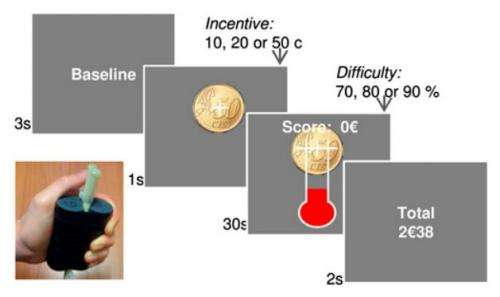January 22, 2013 report
Researchers find clues to how the brain decides when to rest

(Medical Xpress)—A team of researchers in France has found what they call a "signal" that tells a person when to rest while engaging in work, and then when to resume once rested. The team, as they describe in their paper published in the Proceedings of the National Academy of Sciences, used fMRI scans on a group of volunteers to study a part of the brain normally associated with pain perception and found what amounts to a signal calling for the conscious mind to take a break.
Scientists studying how people make decisions regarding work have over time devised theories of cost versus benefit scenarios to describe what causes people to engage in work activities, or to not. Not so well studied is how people come to decide when it's time to take a break. Some have suggested that some part of the brain is constantly engaged in weighing the costs of the work involved with potential rewards, and based on both creates a signal of sorts alerting the rest of the brain to when it's time to pause. This new research supports that theory.
The researchers enlisted the aid of 39 participants who were asked to squeeze a spring-loaded handgrip over and over as they underwent fMRI scans. Each was promised a monetary reward for doing so based on a sliding scale. The longer they squeezed, the better the reward would be.
In analyzing the fMRI images, the researchers discovered that activity in a part of the brain called the posterior insula (normally associated with pain perception), built over time as the volunteers continued squeezing – a signal of sorts. It grew during effort, and then faded during rest times – peaking just before resting. The researchers suggest that when a certain peak is reached, the rest of the brain is alerted to the need to take a break. The team also found that increasing the difficulty of the squeezing led to the signal increasing at a faster rate, but slowed when a bigger reward was offered despite the increased workload. They also found that bumping up the reward during a rest period caused the lowest signal point to come more quickly, indicating that rest time was up sooner than it would have been otherwise.
The researchers suggest that their observations indicate that they brain is constantly engaged in a struggle to maximize reward, while simultaneously minimizing the amount of work needed to get that reward, and uses rests stops to help it get there in a manner best suited to the work at hand.
More information: "A neuro-computational account of how the human brain decides when to have a break," by Florent Meyniel et al. PNAS, 2013. www.pnas.org/cgi/doi/10.1073/pnas.1211925110
Abstract
No pain, no gain: cost–benefit trade-off has been formalized in classical decision theory to account for how we choose whether to engage effort. However, how the brain decides when to have breaks in the course of effort production remains poorly understood. We propose that decisions to cease and resume work are triggered by a cost evidence accumulation signal reaching upper and lower bounds, respectively. We developed a task in which participants are free to exert a physical effort knowing that their payoff would be proportional to their effort duration. Functional MRI and magnetoencephalography recordings conjointly revealed that the theoretical cost evidence accumulation signal was expressed in proprioceptive regions (bilateral posterior insula). Furthermore, the slopes and bounds of the accumulation process were adapted to the difficulty of the task and the money at stake. Cost evidence accumulation might therefore provide a dynamical mechanistic account of how the human brain maximizes benefits while preventing exhaustion.
© 2013 Phys.org
















